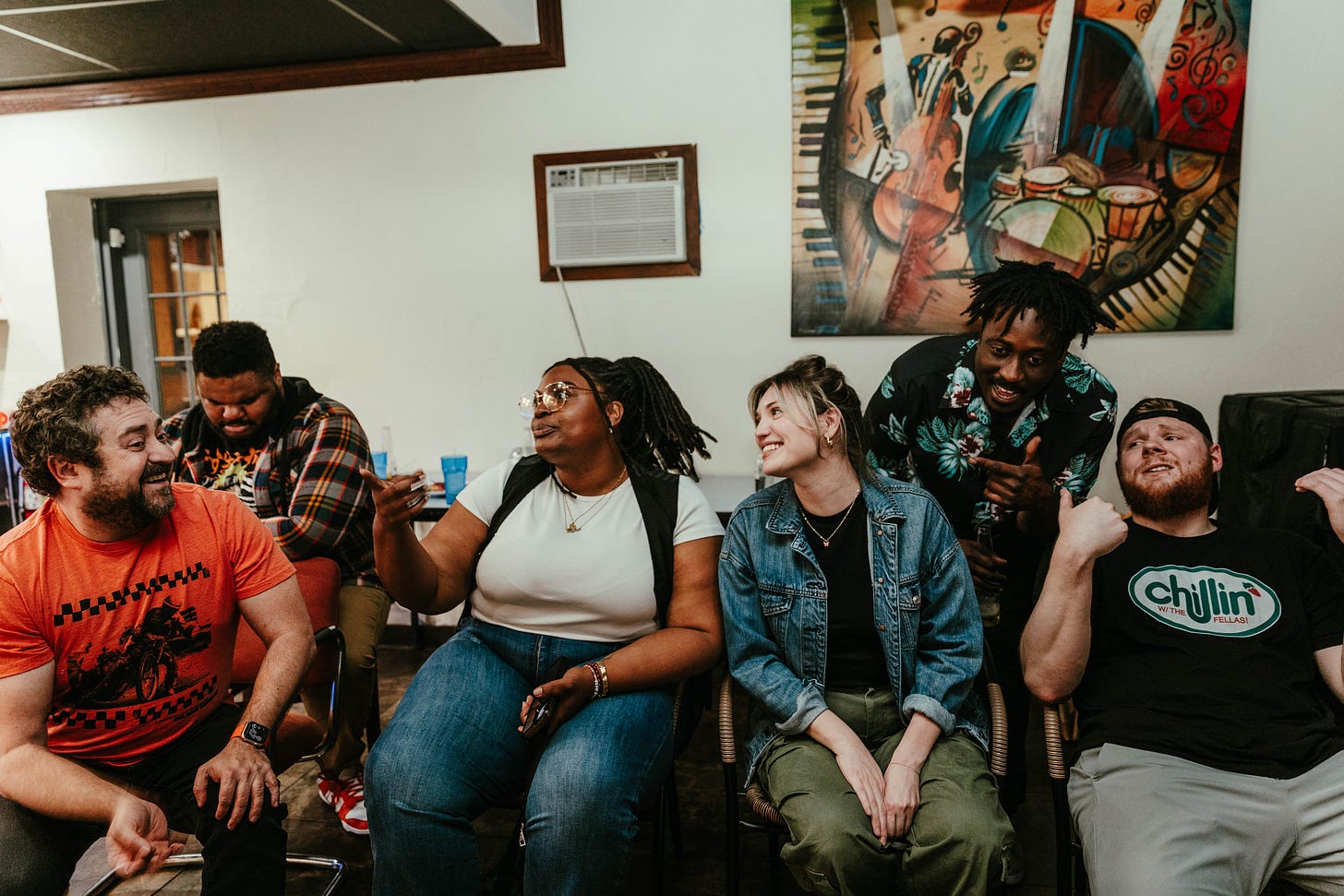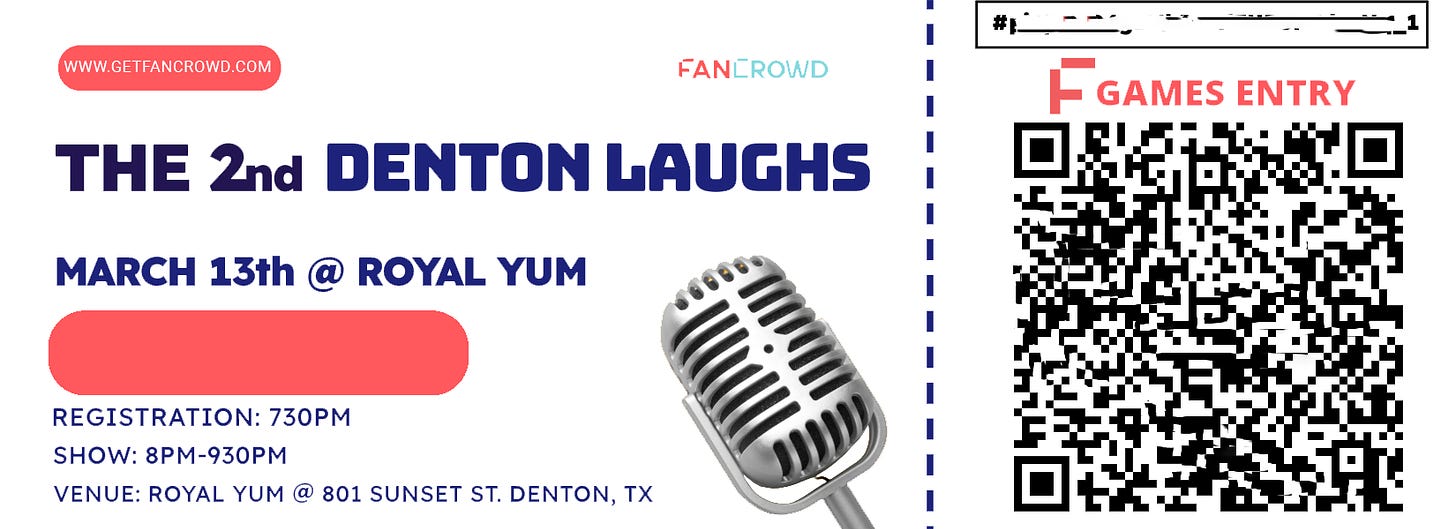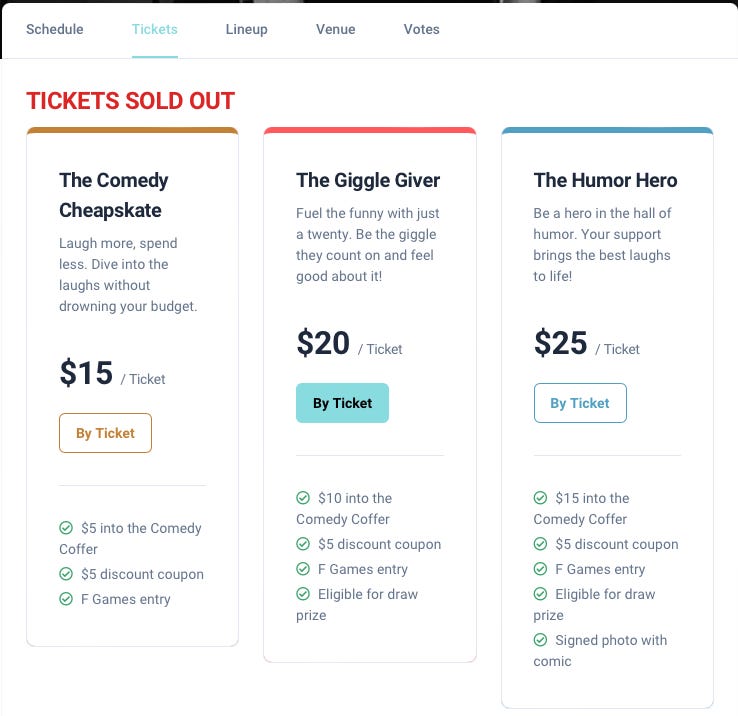
Ever since we adopted ComedyTech at the core of our tech map, it became clear that we have to take a holistic approach rather than a transactional one. Let me explain. If you’ve ever purchased a ticket through TicketMaster or Eventbrite, you’ll notice how there’s event discovery, by address or date. You can buy your ticket, select your seat, and so on. It’s a generally smooth and seamless experience. But once you purchase your ticket and receive your email confirmation, the transaction has completed.
There’s something missing. The rest of the experience is disjointed. In a recent Denton Record-Chronicle article that spotlighted the 2nd Denton Laughs at Royal YUM, where the crowd, wielding nothing but a QR code on their tickets, had the power to financially reward their favorite comedians, catapulting the night beyond mere laughs into a real stake in the game. This echoes the journey Nido detailed in his blog, where he described our pivot from a nebulous wedge strategy to a concrete tool for enhancing community spirit through comedy.
Dallas-Fort Worth-based comedian Jacob Marshall was voted first place by the audience during his stand-up routine at Denton Laughs 2 at Royal Yum restaurant," the Denton Record-Chronicle reported. This demonstrates the real-time impact and engagement our app fosters among audiences.
With new app created by locals, stand-up comics in Denton compete for a bigger cut of ticket revenue, Denton-Record Chronicle, March 31, 2024
Holy shit! We are revolutionizing comedy! We’re not just participants, no sirree, we’re pioneers.
Practically, this means that we have identified the components that make up the creation of a comedy show when we produced ours:
Venue
Lineup
Tickets
Web page
Venue
Luckily for us, I had one at my disposal. But a reliable way to find interested venues is not currently available. An advantage of playing house with a venue was that I also knew what I wanted as a venue owner, without having to second guess it. It’s simple: more diners. Here’s an inside view of our venue’s page views on Yelp.
Notice that climb? That’s not a joke. This is real, tangible proof that has an even more real effect on the bottom line. It translated to a 30% increase in sales during the event weeks. That’s the kind of math a venue owner can appreciate.
This translated to over 400 new subscribers in the span of 2 weeks to our venue’s newsletter. I mean, I thought I was killing it with 891 subscribers to panda mistake. To a venue, that can be very valuable. Now I know that my tech knowledge allows me to use enterprise level tools on a local restaurant, which means that I understand that for most local restaurant owners, email lists aren’t as valuable as they are to me. Restaurants are our primary non-comedy club venue to host a comedy show. While breweries, bars and cafes are more popular spaces for open mic’s, restaurants offer an opportunity to a different demographic, not typically found in those spaces.
With the understanding that our users prefer an abstraction and an executive level view of things, we can build a plethora of marketing tools for venues built around the customers who opt-in to receive relevant marketing content.
Lineup

Producers don’t really need software to put a lineup together. They know who would be a fit for any project. They know who lives where and what their preferences are. But once they have gone through their DM’s and texts and confirmed their lineup, they may need to mention them in the event description.
One of the unexpected surprises from our Denton Laughs experience was that comedians felt our voting format was like a “competition”. It wasn’t something you would do regularly. But that doesn’t mean fans aren’t interested in ranking performances and feeling more engaged with the art of comedy.
Because.. we’ve been talking to the comedians and holy.. they hardly ever do talk to their fans. They don’t even know who likes them past the dimly lit laughing faces, fans are a crowd. The crowd either loves you or hates you. I thought that was weird. Here I am trying to know my customers and these guys have no idea who wants to see them again? That’s an easy problem to fix. There are many problems that can easily be fixed in this forgotten lost Amazonian tribe that is comedy.
Tickets
We weren’t sure what we wanted at first, but there are some obvious and less obvious common features in the industry. For example, tiered pricing based on time of purchase is very common. Discounts and promotions, less so. The thing that would put someone off selling tickets on one of the big sits is that they take a big bite off the sales of tickets. For example, Eventbrite charges 3.7% + $1.79 per sold ticket + 2.9% of the total order. I mean, damn..
Now the reason why most barebones ticketing solutions charge ~$1 per ticket + order processing fees is because they don’t have the massive list of event goers that any one of the big and popular sites have. But in the case of standup comedy shows, this is less relevant because more than 50% of comedy show tickets are sold at the door, with most customers unknown. And I think there’s an opportunity to get to know them better.
Web page
No one wants to spend time fiddling with websites, but a basic event page would do. A place that people can buy tickets on. Something to maybe showcase the profiles of the comedians, venue details, menus, schedule, etc.
And with that, you have all the pieces to put together a comedy show. These tools exist for none of them are new or exciting in themselves. But no one has ever put them together in a way that allows you to build a full comedy experience, with an infinite feedback loop.
Our compass was off by a few clicks, our so-called wedge strategy was more a hidden gem, a role cloaked not just in laughter but in a profound community spirit.
Not all wedges are created equal, Nido Ajami
And as we build our beachhead, I realize that none of it can happen without being a part of the community we are building this around. Alright, back to work then. ComedyTech won’t build itself!






